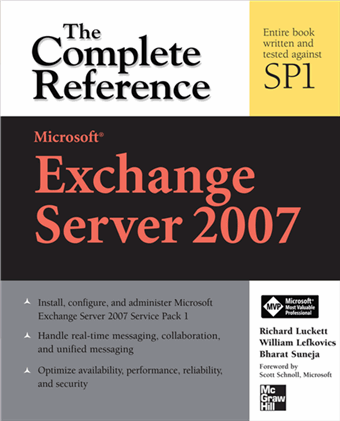Besides Terry Myerson's post on the team blog providing some details about SP1 (read previous post "Exchange Server 2007 SP1: A bag of goodies!"), there weren't a lot of details about SCR available publicly until TechEd 2007 in Orlando earlier this month.
Looking at the search engine keywords used to reach this blog, and the number of questions on the Exchange chat on TechNet today (transcript will be posted on the TechNet site soon), I'm not surprised to see interest in Standby Continuous Replication (SCR) is quite high.
The Cluster Continuous Replication (CCR) functionality present in the shipping (RTM) version of Exchange Server 2007 is a great choice for high availability within a data center, and can be implemented across data centers as well, albeit with some limitations and considerations like placement of the File Share Witness [read previous post "CCR Over WAN: Failover and FSW questions answered"], extending the subnet across data centers, etc. The latter is a limitation of high-availability clustering as it's implemented in Windows Server 2003, and not an inherent limitation of Exchange or its Database Continuous Replication component that makes capabilities like LCR, CCR and SCR possible. It should be removed with the release of Windows Server 2008, aka "Longhorn Server".
However, SCR is what really provides the needed capability to survive a data center outage.
Paul Robichaux has some more details in Windows IT Pro's Exchange and Outlook UPDATE newsletter today, titled "SCR in the Spotlight" (the link should be available without subscription for short time).
Looking at the search engine keywords used to reach this blog, and the number of questions on the Exchange chat on TechNet today (transcript will be posted on the TechNet site soon), I'm not surprised to see interest in Standby Continuous Replication (SCR) is quite high.
The Cluster Continuous Replication (CCR) functionality present in the shipping (RTM) version of Exchange Server 2007 is a great choice for high availability within a data center, and can be implemented across data centers as well, albeit with some limitations and considerations like placement of the File Share Witness [read previous post "CCR Over WAN: Failover and FSW questions answered"], extending the subnet across data centers, etc. The latter is a limitation of high-availability clustering as it's implemented in Windows Server 2003, and not an inherent limitation of Exchange or its Database Continuous Replication component that makes capabilities like LCR, CCR and SCR possible. It should be removed with the release of Windows Server 2008, aka "Longhorn Server".
However, SCR is what really provides the needed capability to survive a data center outage.
Paul Robichaux has some more details in Windows IT Pro's Exchange and Outlook UPDATE newsletter today, titled "SCR in the Spotlight" (the link should be available without subscription for short time).
Labels: Clustering, Exchange Server 2007

 Exchangepedia Blog is read by visitors from all 50 US States and 150 countries world-wide
Exchangepedia Blog is read by visitors from all 50 US States and 150 countries world-wide



0 Comments:
Post a Comment
Links to this post:
Create a Link
<< Home